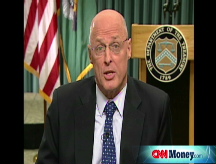Economic rebound at least a year away
U.S. economy likely won't improve until summer 2009, with more layoffs and higher inflation looming, according to a survey of CFOs.
NEW YORK (CNNMoney.com) -- Economic woes are expected to continue until at least mid-2009, and things may get worse before they get better, according to a quarterly survey of chief financial officers.
The quarterly Duke University/CFO Magazine Global Business Outlook study found 71% of more than 1,000 CFOs surveyed said the U.S. economy will not begin to rebound until 2009. And 54% think the turnaround will happen by next summer at the earliest.
"This could be the longest slowdown since the double dip recession of 1979-81," said John Graham, director of the survey.
There was some positive news from the survey: Overall, optimism rose slightly from the previous quarter.
Still, financial chiefs from a broad range of public and private companies hold a grim view of the economy and attribute their pessimism to a tough jobs market and rising inflation. Weak consumer demand and high fuel costs also topped their concerns.
CFOs said difficulty in attracting and retaining high quality employees is their the top concern, followed by the difficulty of planning in the uncertain economic environment. Accordingly, they expect employment to fall another 0.2% in the next 12 months.
A net 324,000 jobs have already been lost in 2008, the worst start to a year since 2002, when the U.S. economy was just coming out of the last recession.
As the economy sheds more and more jobs, businesses said they are increasingly worried about the fallout of rising prices and mounting layoffs.
With soaring fuel and food prices, 45% of companies said they have passed along rising costs to customers in the form of higher prices.
"In recent years, U.S. companies have largely shrugged off increasing fuel costs," said Kate O'Sullivan of CFO Magazine. "For the first time in the history of our survey, fuel costs are tied as the top corporate concern, and ... a majority of companies tell us they have taken explicit actions in response to increased fuel costs."
That may exacerbate inflationary pressures, as only a quarter of the businesses concerned about rising prices said they will absorb those costs by cutting into profit margins. As a result, the surveyed CFOs said they are forecasting prices to increase by 4.1% by the same point a year from now.
"Rising fuel costs are seeping into the overall price level, contributing to inflationary expectations of over 4%," O'Sullivan noted.
Despite its gloomy findings, the survey suggests that CFOs are starting to feel better about the economic outlook. Pessimists outnumbered optimists by 8 to 1 in the past two quarters, but that ratio has improved to about 3 to 1.
"For the last several quarters, CFOs reported bad news and more bad news," said Campbell Harvey, the survey's founder. "This quarter, we're seeing bad news with a little bit of good news."
Harvey said the improved ratio potentially indicates stabilization. But he warned that the worst is still not over, and encouraged the Federal Reserve not to raise its key funds rate just yet.
"This is not the time to cut off the meds," he said. ![]()



